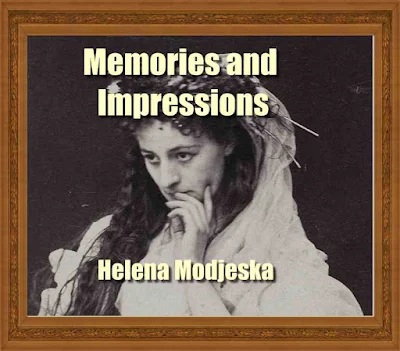Memories and Impressions of Helena Modjeska; an autobiography
From introduction:
The car comes to a stop. After several years of absence, I am in Poland again. The sun sheds upon the snow myriads of sparks, which glisten like so many precious gems; a purple strip of mist rises above the distant forest of dark, pointed pines, which form a background to white, humble huts, throbbing with lives of patience and toil, under the iron hand of the ruler. ...
I feel a mysterious glow penetrating into the very depth of my heart, and tears rise to my eyes; I humbly bow my head and whisper, "Hall, beloved ..." "Einsteigen, Meine Herrschaften," shouts the metallic voice of the conductor, waking me from my revery, and by his sudden cry in a foreign language brutally recalling to my mind the misfortunes of my country. As we proceed further through German Poland we look in vain for any outward sign of the nationality of the inhabitants; there is none.
No Polish inscriptions, no Polish names of the stations, no railroad employees allowed to speak Polish; yet crowds of peasants and workingmen hurrying to the fourth-class cars speak only the vernacular. Strange to say^there is one thing that all the efforts of the repressive governmental system cannot destroy, and that is the deep-rooted patriotism of the people, nor can they make of no avail their heroic struggle to preserve their mother tongue.
It was almost dark when we reached a station with a name evidently Polish, but so distorted by the Germanizing process that we could not make it out. Here our train stopped. We had been delayed and had missed the connection.
The prospect of spending the night in some awful inn in this out-of-the-way place appeared most unpleasant. My husband tried to charter a special train to Oswiecim (the Austrian frontier station), thirty miles away, where we could make the connection for Cracow, but there was not the slightest chance of getting such a luxury in that small place.
While we were still holding council on the course to take, the station master, a jovial, good-natured German, proposed to us to go this short distance by a freight train; and laughing, he invited us to the conductor's box.
In Germany, they have no regular caboose on the freight train, but at the end of the rear car, there is a kind of covered box or cage perched near the roof where the conductor remains confined between stations. My American friend. Miss L. B. F., who, prompted by the extravagant idea of visiting the land of "Thaddeus of Warsaw," had joined us in our travels, was elated with the station master's suggestion. With all the vigour of youth, good health, and good humour, she hastily climbed the steep, ladder-like stairs conducting to the box.
We followed more leisurely. There we sat, five of us, my buoyant American, my husband, my grumbling maid, the conductor, and I, on very narrow seats, in a very tight place, and in an overheated, suffocating atmosphere, making the best of our queer situation.
The conductor, a young man with a pale, sad face, seeing us nearly smothered with rugs and furs, from which we tried in vain to extricate ourselves, speaks with a strangely patient and sympathetic voice, marked by a foreign accent. Evidently, he is a Pole, but does not dare to address us in Polish, lest he lose his position. ... I happened to complain in Polish of the heat; the conductor, without a word, puts hi^ pencil behind his ear and opens the window. It is dark and foggy.
Download Memories and impressions of Helena Modjeska 14.3 MB-


